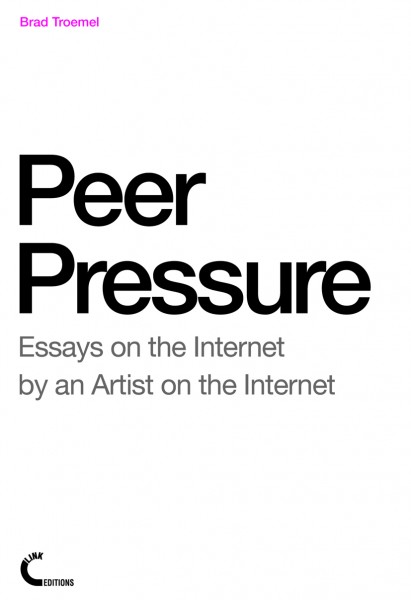Book-ish Territory: A Manual of Alternative Library Tactics (2011)
Filed under book | Tags: · city, decentralization, diy, everyday, knowledge, knowledge production, library, urbanism

“This project aims to challenge the model of the institutionalized library, calling for a new decentralized system. The fundamental characteristics of a library and a city are the same: they both serve as spaces of exchange and encounter. Dispersing library content throughout the city would be of mutual benefit to the library and city: opportunities for informational exchange and casual encounter would dramatically increase.” (from introduction)
Published in May 2011
208 pages
via publicpraxis.com
PDF (single PDF, 24 MB, no OCR, low quality, updated on 2014-12-22)
View online (Issuu.com)
Brad Troemel: Peer Pressure: Essays on the Internet by an Artist on the Internet (2011)
Filed under book | Tags: · 4chan, anonymous, art, internet, internet art, memes, net art, relational aesthetics, surf club, tumblr, web, youtube

Peer Pressure is a collection of essays previously published online between 2010 and 2011. In the author’s words, “each essay is an impassioned description or prescription to understand the digital space we inhabit differently.” Most of these writings have been highly influential for the (relatively) small community the author addresses, eliciting many heated debates. The texts idealistically address creative platforms, image aggregators, relational practices, internet memes and much more.
Publisher LINK Editions, October 2011
ISBN 9781470915612
138 pages
Licensed under Creative Commons Attribution-NonCommercial-ShareAlike 3.0
PDF (Lulu.com)
Comment (0)Patrice Flichy: The Internet Imaginaire (2007)
Filed under book | Tags: · 1990s, arpanet, computing, cyberpunk, cyberspace, freenet, history of communications, history of computing, history of technology, internet, networks, technology, usenet, utopia, virtual communities, virtual reality, web, wired

In The Internet Imaginaire, sociologist Patrice Flichy examines the collective vision that shaped the emergence of the Internet—the social imagination that envisioned a technological utopia in the birth of a new technology. By examining in detail the discourses surrounding the development of the Internet in the United States in the 1990s (and considering them an integral part of that development), Flichy shows how an entire society began a new technological era. The metaphorical “information superhighway” became a technical utopia that informed a technological program. The Internet imaginaire, Flichy argues, led software designers, businesses, politicians, and individuals to adopt this one technology instead of another.
Flichy draws on writings by experts—paying particular attention to the gurus of Wired magazine, but also citing articles in Time, Newsweek, and Business Week—from 1991 to 1995. He describes two main domains of the technical imaginaire: the utopias (and ideologies) associated with the development of technical devices and the depictions of an imaginary digital society. He analyzes the founding myths of cyberculture—the representations of technical systems expressing the dreams and experiments of designers and promoters that developed around information highways, the Internet, Bulletin Board systems, and virtual reality. And he offers a treatise on “the virtual society imaginaire,” discussing visionaries from Teilhard de Chardin to William Gibson, the body and the virtual, cyberdemocracy and the end of politics, and the new economy of the immaterial.
Publisher MIT Press, 2007
ISBN 0262062615, 9780262062619
255 pages
PDF (updated on 2012-7-25)
Comment (1)
